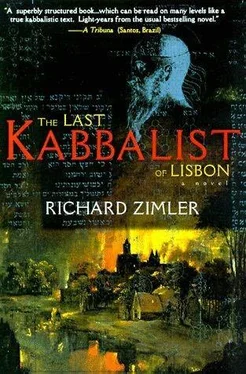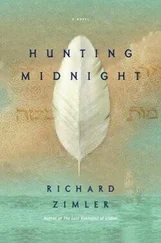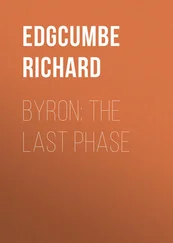Richard Zimler - The Last Kabbalist of Lisbon
Здесь есть возможность читать онлайн «Richard Zimler - The Last Kabbalist of Lisbon» весь текст электронной книги совершенно бесплатно (целиком полную версию без сокращений). В некоторых случаях можно слушать аудио, скачать через торрент в формате fb2 и присутствует краткое содержание. Год выпуска: 1998, Издательство: Arcadia Books, Жанр: roman, Исторический детектив, Философия, на английском языке. Описание произведения, (предисловие) а так же отзывы посетителей доступны на портале библиотеки ЛибКат.
- Название:The Last Kabbalist of Lisbon
- Автор:
- Издательство:Arcadia Books
- Жанр:
- Год:1998
- ISBN:нет данных
- Рейтинг книги:5 / 5. Голосов: 1
-
Избранное:Добавить в избранное
- Отзывы:
-
Ваша оценка:
- 100
- 1
- 2
- 3
- 4
- 5
The Last Kabbalist of Lisbon: краткое содержание, описание и аннотация
Предлагаем к чтению аннотацию, описание, краткое содержание или предисловие (зависит от того, что написал сам автор книги «The Last Kabbalist of Lisbon»). Если вы не нашли необходимую информацию о книге — напишите в комментариях, мы постараемся отыскать её.
The Last Kabbalist of Lisbon — читать онлайн бесплатно полную книгу (весь текст) целиком
Ниже представлен текст книги, разбитый по страницам. Система сохранения места последней прочитанной страницы, позволяет с удобством читать онлайн бесплатно книгу «The Last Kabbalist of Lisbon», без необходимости каждый раз заново искать на чём Вы остановились. Поставьте закладку, и сможете в любой момент перейти на страницу, на которой закончили чтение.
Интервал:
Закладка:
A murderer, yes. I admit to having slain one man and contracted to end the life of another. My children will read of the circumstances and form their own judgments. They are old enough now to know everything. A heretic, I think not. But if I am, then it was the events which I will shortly describe that forced the arrows of heresy into my flesh. As for my heart, I leave it for my loved ones to name its governess. May truth emerge from these pages without fear, like the trumpeting call of a shofar welcoming Rosh Hashanah. And may I, too, finally free myself of my last delusions and from the vestiges of the mask I donned to hide my Judaism as a boy. Yes, I expect to learn much about myself as my pen follows my remembrances; when memory is allowed free reign to probe the past, does it not always gift us with self-knowledge?
Of course, guilt for my ignorance and failings—and for my more terrible sins—has accompanied me into exile in Constantinople, clings to me even now. Some would say it is even the deepest of my motivations. Yet as I gift Hebrew letters onto this polished sheepskin, I realize that I am most inspired by the chance to speak across a span of decades to still others as yet unnamed—my unborn grandchildren and those of my sister, Cinfa. To all our descendents, I say: read this story and you will know why your ancestors left Portugal; the great sacrifice my master made for you; what happened to the Jews of Lisbon when this century possessed but six Christian years. To ensure your survival, these are events to which your memories should cling like orphaned children.
Most importantly, if you follow the melody and rhythm of these words toward their final cadence, you will learn why you should never set foot in Christian Europe.
So make no mistake, under the surface of this story lies the razor edges of a tale of warning. I am convinced that it is your safety which prompted Uncle Abraham to appear to me and summon me to Portugal. Were I not to write, were memory to end in tepid silence, I might have your deaths on my hands as well.
As for the weave of the mystery which I will unfurl for you, my enemies would say that it is sure to include intricate arabesques out of a desire to conceal the blood staining my own hands. The evidence will point in the other direction. Uncle Abraham has gifted me with this chance to live fully as myself, and I will not disappoint him again. So if you find complication—even contradiction—amongst the twill of my more modest phrases it is because I wish for you to see the events as they truly occurred, to see me as I am. For a Jew is never the simple creature the Christians have always wanted us to believe. And a Jewish heretic is never so single-minded as our rabbis would claim. We are all of us deep and wide enough to welcome a river of paradoxes and riddles into our souls.
There is a last confession which I must now make: I have no idea why Uncle Abraham called me by my elder brother Mordecai’s name in my vision, and I find my ignorance disquieting. It is as if there is some deeper significance to my master’s appearance, an inner layer of meaning to the deaths of twenty-four years ago, which I still cannot grasp. Why, for instance, has my uncle shown himself to me only now? Clearly, I need more time to consider this matter. And yet, perhaps he meant for the light of understanding to penetrate my darkness as I record our story. Will I come to comprehend the subtler connections between the past and present only when my manuscript nears its end? The possibility makes me smile, calms my doubts a little; it would be just like my uncle to demand a day and night of earthly work before presenting me with the last core of his heavenly meaning! And so, I continue forward…
When I first considered tracing our tribulations across a page of manuscript, my family and I were hiding in our cellar. The mystery had just opened before me in all its complexity. It is there where I began my story twenty-three years ago. And it is there where we will start again.
Of three events we shall speak before we come to the murder which changed our lives: the passing of the flagellants; an injury to a dear friend; and the arrest of a family member. Had I understood the meaning of these portents, had I read them as verses of a single poem scripted by the Angel of Death, I could have saved many lives. But ignorance betrayed me. Perhaps, as you follow my words across these pages, you will fare better. May you be blessed with clear vision.
So sit yourself in a quiet room graced with a circle of fragrant bushes or flowers. Face east, toward beloved Jerusalem. Untie your knots of mind with chant. And let a soft candlelight shadow these pages as you turn them.
Bruheem kol demuyay eloha! Blessed are all God’s self-portraits.
Berekiah Zarco, Constantinople
Sixth of Av, 5290 (1530 CE)
BOOK ONE
Chapter I
When I was eight, in the Christian year of fourteen ninety-four, I read about the sacred ibises who helped Moses cross an Ethiopian swamp riddled with snakes. I drew a scythe-beaked creature in scarlet and black with my Uncle Abraham’s dyes and inks. He held it up forinspection. “Silver eyes?” he questioned.
“Reflecting Moses, how could they be any other color?”
Uncle kissed my brow. “From this day on, you will be my apprentice. I will help you change thorns to roses, and I swear to protect you from the dangers which dance along the way. The pages that are doors will open to our touch.”
How could I have known that I would one day fail him so completely?
Imagine being outside time. That the past and future are revolving around you, and you cannot place yourself properly. That your body, your receptacle, has been numbed free of history. Because I feel this way, I can see clearly when and where the evil started: four days ago, on the twenty-second of Nisan; in our Judiaria Pequena, the Little Jewish Quarter of the Alfama district of Lisbon.
It was a jeweled morning much like any of the opal beads on the necklace of that spring month. The year was fifty-two sixty-six for the New Christians. April the sixteenth of fifteen and six for the accursed Christians of heart.
From the darkness of early Wednesday morning, hiding here in the cellar, I remember the dawn of Friday as if its sunlight heralded the first notes of an insane fugue.
Concealed behind one of these notes of melody, camouflaged in memory, is the face I seek.
The day of our first Passover seder began dim and dry, like all the dawns of late. We hadn’t been blessed with rain in more than eleven weeks. And would have none today.
As for the plague, it had been sending shivers through our bodies and souls since the second week of Heshvan—more than seven months now.
King Manuel’s half-made Christian doctors had resolved that cattle were perfect for soaking up the airborne essences which they blamed for the disease, and so two hundred dazed and overheated cows had been let loose to wander the streets.
Manuel himself had long fled our misery with most of the aristocracy. From Abrantes, three weeks earlier, he’d issued a decree establishing the construction of two new cemeteries outside the city walls for the scores who were taken to God each week.
The souls of the dead were beyond being encouraged by such a gesture, of course. And one could hardly blame the living for regarding the decree as simply one more indication of the King’s ineffectual pragmatism and cowardice. Was it a turning point? Certainly, daily life began to take on an edge of cruel and despairing madness. In the last three days, I’d seen a collapsed donkey blinded with his master’s dagger, his eyes spurting blood, and a girl of no more than five hurled shrieking from the rooftop of a four-story townhouse.
Читать дальшеИнтервал:
Закладка:
Похожие книги на «The Last Kabbalist of Lisbon»
Представляем Вашему вниманию похожие книги на «The Last Kabbalist of Lisbon» списком для выбора. Мы отобрали схожую по названию и смыслу литературу в надежде предоставить читателям больше вариантов отыскать новые, интересные, ещё непрочитанные произведения.
Обсуждение, отзывы о книге «The Last Kabbalist of Lisbon» и просто собственные мнения читателей. Оставьте ваши комментарии, напишите, что Вы думаете о произведении, его смысле или главных героях. Укажите что конкретно понравилось, а что нет, и почему Вы так считаете.












